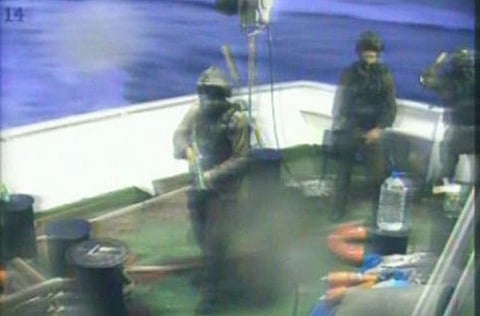Israel has challenged the world
Tel Aviv has reintroduced gun-boat diplomacy and colonisation — a throwback to the days when there was no UN

It all depends on how you interpret the ‘right to live’. The Israelis believe that they can live only if their state, Israel, is not challenged by any power or people in the Middle East. Others, particularly the Palestinians, who were once strongly opposed to the existence of Israel, believe that they, however weak militarily, also have the right to live.
Over the years, the countries in the region have come round to extending recognition to Israel, provided it withdrew to its original borders, mandated by the UN in 1948 when the state was founded. Israel has neither vacated the territories it has forcibly occupied nor has it stopped the colonisation of the Occupied Territories.
Tel Aviv reluctantly agreed last year to vacate the Gaza Strip — a small piece of land wedged between Egypt and Israel — but has kept it under close supervision and denied its occupants contact with the outside world.
Although most of the 1.5 million people in Gaza are sustained by the United Nations Relief and Works Agency for Palestine Refugees in the Near East (UNRWA), Hamas believes that it is the custodian of Gaza’s citizens.
Doing without necessities
Because of Israel’s blockade, people in Gaza generally live on less than $1 a day and 60 per cent of them have no access to water. Luxury goods are banned. A UN survey said last year that it took 68 days to deliver health and paediatric hygiene kits.
The nine-ship aid flotilla, attacked by Israeli troops last week, was carrying food, medicine and other necessities, collected by volunteers from Britain, Ireland, Algeria, Kuwait, Greece and Turkey. There was nothing hush-hush about the mission. It was a humanistic effort that was well publicised and well supported. But Israel did not approve of it because it believed that the people in Gaza had received enough food from UNRWA.
That Tel Aviv behaves in a brutish, inhuman way is well known. In electing Prime Minister Benjamin Netanyahu, known for his dictatorial methods, Israel opted for a ruler with no interest in conciliation, compromise or peace. The world is naturally aghast over the Israeli attack and its policies.
Yet Tel Aviv’s attitude should not come as a surprise, because it has always lived in this manner and has unambiguously told the world that it will treat the Palestinians and their woes in its own way. After the death of Yasser Arafat, the Palestinian leader, there has been no one of his stature to draw attention to the plight of Palestinians, some of whom have taken refuge in the Gaza Strip. International opinion reacts to a particular incident, such as the attack on the flotilla, but not to the demands of Palestinians.
The West, particularly America, is most to blame for ignoring Palestine. There has been little condemnation from Non-Aligned Movement, too. India’s neglect is painful because it is one of the very few countries that spoke against Israel’s policy of annexation. True, New Delhi is dependent on Tel Aviv for certain arms. Yet people expect more from India. Its foreign office’s expression of condemnation is neither adequate nor unequivocal.
Too soft
Prime Minister Manmohan Singh should have issued a sterner statement. True, he cannot take Tel Aviv to task as Jawaharlal Nehru would do, openly siding with the oppressed Palestinians. He did not give recognition to Israel as long as he lived. Even his daughter, Indira Gandhi, followed his path. But a softer stance was taken by the subsequent Congress government.
The world should realise that the attention it paid to the flotilla had no effect on Israel, whose troops operated in international waters. Already the result of Israel’s strong-handed methods is that outrage in Gaza is growing.
The fact is that Israel has devised a policy to awe the countries in the region and suppress anti-Jewish opinion. So long as Tel Aviv believes that it is surrounded by ‘hostile’ states and that it has to maintain its superiority, it will continue to acquire more weapons and sabotage any effort at conciliation.
America is the only nation that can put pressure on Israel. But every US president weighs how much he can do without annoying the powerful Jewish lobby in America. President Barack Obama was thought to be a different kettle of fish, but his reaction has been lukewarm. Obama needs to emphasise to Israel that peace and security in the region can be achieved only through conciliation, not by force. The UN Security Council’s statement was also too tepid to be taken seriously.
The attack on the flotilla indicates that might has become the true arbiter in the world. Countries within any region need to come together to withstand pressure from the outside.
Israel has reintroduced gun-boat diplomacy and colonisation — a throwback to the days when there was no UN, no forum to discuss aggression and no lobby to seek peace. What has happened in Gaza cannot be taken lightly. The entire international community has to sit up and take notice. Israel cannot get away with squashing resistance from Palestine, where people have been reduced to a commodity that Tel Aviv can peddle in any manner it likes.
Israel is not the face of Jews, who are known as a peace-loving people all over the world. Israel may have corrupted Jewish society, but it has not replaced its value system. Let us not allow Israel to blacken the name of the Jews. They have proud traditions.
Kuldip Nayar is a former Indian high commissioner to the United Kingdom and a former Rajya Sabha member.


